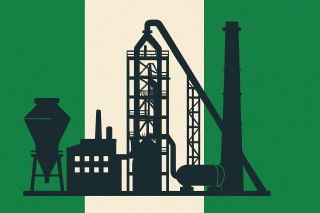This week Ukrcement, the Ukranian cement association, reported that counterfeit cement was prevalent in Ukraine's cement market. It is more disappointing news for local producers who have seen cement production drop by 3.7 per cent in the first seven months of the year.
The cement association recently commissioned GFK Ukraine to carry out research into the packaging of cement products sold in the domestic retail market. The research agency visited 180 building material outlets, supermarkets and chain stores to study whether the cement bag packaging represented the original and official factory packaging of domestic cement producers Ivano-Frankovskcement, CRH plc, Dyckerhoff Cement Ukraine, HeidelbergCement Ukraine and Eurocement-Ukraine. The study used three categories in its research and reported on the falsification of well-known brands and quality of other unbranded cements. In total, the proportion of false brands was 11.6 per cent in terms of observation and eight per cent in terms of the physical volume of cement.
The association said that the violation of the bag labelling is the main sign of poor-quality counterfeit cement. Regulatory documents state that five mandatory items must be indicated on the bag: the name of the cement manufacturing company, the conventional designation of cement, the designation of the normative document, the net weight and the conformity mark.
"The number of counterfeit products has increased in the Ukrainian market, which does not meet the standards. In general, experts estimate the level of falsification in the world market of building materials is in the range of 5-7 per cent. For modern Ukraine, because of the lack of mechanism for effective control, I would estimate this share to be 10 per cent," said Ellena Shulyak, Construction BRDO.
Bridging the certification gap
Much of the country's difficulties over counterfeiting stem from 1 January 2018 when compulsory certification of building materials was cancelled. In 2015 a plan was hatched to bring Ukraine's cements standards in line with the European standards and to harmonise them. The initiative was designed to stimulate the domestic building materials market and enable Ukraine's producers to export cement to Europe. It was assumed that by January 2018 Ukraine would be in a position to be protected by the provisions of the EU Regulation 305/2011, which covers the EU's quality of construction materials. However, Ukraine has not been able to implement the EU regulation in time before the certification was effectively cancelled at the start of this year.
Cement producers take preventative action
Meanwhile, cement producers have been taking action to address the counterfeit issue. In 2017 Eurocement-Ukraine, the largest cement manufacturer in the country with its plants located at Balakliya and Kramatorsk, developed new bags for each cement brand. The new bags include various measures to protect the company's products against counterfeiting:
• three layers of paper and one layer of polythene
• a bar code, data on certification products and compliance with the Draft Standard for Trial use (DSTU)
• printing of the company’s trademark and slogan ‘Only Qualitative Balakley Cement’
• a QR code and the company’s website with tear-off tape on its PROF series of products.
Government measures
As a first step in protecting the domestic industry, the Ministry of Economic Development and Trade of Ukraine has already banned clinker imports originating from Russia in August, but further measures could be necessary. This follows an investigation in July by the Interdepartmental Commission on International Trade into anti-dumping of cement when imports from Russia, Belarus and Moldova came under investigation. Ilyashhev & Partners are now appointed to monitor imports over a 12-18 month period.
